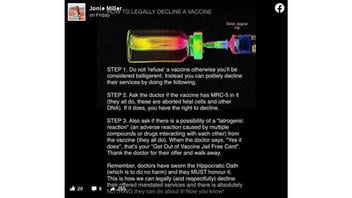
Can a U.S. citizen "legally decline" a government-ordered vaccine by asking if it contains "MRC-5" or a possibility of an "iatrogenic reaction"? No, that's not true: The U.S. Supreme Court ruled that the government can force vaccinations, and a citizen can only avoid it if they can prove that they are not "a fit" for the vaccine, and that it would "seriously impair their health" or "probably cause his death."
The claim appeared in a meme (archived here) on Facebook on April 17, 2020, under the title "HOW TO LEGALLY DECLINE A VACCINE". It opened:
STEP 1. Do not 'refuse' a vaccine otherwise you'll be considered belligerent. Instead you can politely decline their services by doing the following.STEP 2. Ask the doctor if the vaccine has MRC-5 in it (they all do, these are aborted fetal cells and other DNA). If it does, you have the right to decline.STEP 3. Also ask if there is a possibility of a "latrogenic reaction" (an adverse reaction caused by multiple compounds or drugs interacting with each other) from the vaccine (they all do). When the doctor says, "Yes it does", that's your "Get Out of Vaccine Jail Free Card". Thanks the doctor for their offer and walk away.Remember, doctors have sworn the Hippocratic Oath (which is to do no harm) and they MUST honour it. This is how we can legally (and respectfully) decline their offered mandated services and there is absolutely NOTHING they can do about it! Now you know!
This is what the post looked like on Facebook at the time of writing:
The presence of MRC-5, discussed below, in a vaccine and possible "iatrogenic reactions" from a vaccination, also discussed below, do not meet the standards set when the U.S. Supreme Court decided the issue with a 7-2 vote in 1905.
The high court ruled that a local, state, or the federal government can make vaccinations mandatory. A citizen can only avoid the vaccination if they can prove that it would "seriously impair their health" or "probably cause his death." Otherwise, there is no "Get Out of Vaccine Jail Free Card."
Justice John Marshall Harlan wrote in the majority opinion in HENNING JACOBSON, Plff. in Err., v. COMMONWEALTH OF MASSACHUSETTS, which was decided in 1905:
Until otherwise informed by the highest court of Massachusetts, we are not inclined to hold that the statute establishes the absolute rule that an adult must be vaccinated if it be apparent or can be shown with reasonable certainty that he is not at the time a fit subject of vaccination, or that vaccination, by reason of his then condition, would seriously impair his health, or probably cause his death. No such case is here presented. It is the cause of an adult who, for aught that appears, was himself in perfect health and a fit subject of vaccination, and yet, while remaining in the community, refused to obey the statute and the regulation adopted in execution of its provisions for the protection of the public health and the public safety, confessedly endangered by the presence of a dangerous disease.
In the 1905 case, the plaintiff Jacobson was ordered to pay a $5 fine for refusing a smallpox vaccination.
But what if someone asks if MRC-5 is in the government-mandated vaccine? No. And contrary to the meme, not all vaccines are connected to MRC-5, which are cells derived from a fetus aborted in 1966.
An ABC News article titled What Aborted Fetuses Have to Do With Vaccines explained in 2015:
Other common vaccines, including those for chicken pox, hepatitis and rabies, are also propagated in cells originating from legally aborted human fetuses, according to the FDA.
"These abortions, which occurred decades ago, were not undertaken with the intent of producing vaccines," said a spokeswoman for the U.S. Centers Disease Control and Prevention.
The original cells were obtained more than 50 years ago and have been maintained under strict federal guidelines by the American Type Culture Collection, according to Merck.
"These cell lines are now more than three generations removed from their origin, and we have not used any new tissue to produce these vaccines," the company added in its statement.
To say that the vaccines contain a significant amount of human fetal tissue, as some objectors to the vaccines claim, is misleading, stressed Dr. Paul Offit, the director of the vaccine education center at the Children's Hospital of Philadelphia.
"There are perhaps nanograms of DNA fragments still found in the vaccine, perhaps billionths of a gram," he said. "You would find as much if you analyzed the fruits and vegetables you eat."
The distant connection with an abortion in 1966 is not a reason for Catholics to refuse vaccinations, according to a Vatican statement on the religious objections to the use of MRC-5 in the production of vaccines. The guidance issued by Pope Benedict XVI in 2005 noted that the vaccines "connected with acts of abortion" were limited to:
A) Live vaccines against rubella:
the monovalent vaccines against rubella Meruvax®!! (Merck) (U.S.), Rudivax® (Sanofi Pasteur, Fr.), and Ervevax® (RA 27/3) (GlaxoSmithKline, Belgium);
the combined vaccine MR against rubella and measles, commercialized with the name of M-R-VAX® (Merck, US) and Rudi-Rouvax® (AVP, France);
the combined vaccine against rubella and mumps marketed under the name of Biavax®!! (Merck, U.S.),
the combined vaccine MMR (measles, mumps, rubella) against rubella, mumps and measles, marketed under the name of M-M-R® II (Merck, US), R.O.R.®, Trimovax® (Sanofi Pasteur, Fr.), and Priorix® (GlaxoSmithKline UK).
B) Other vaccines, also prepared using human cell lines from aborted foetuses:
two vaccines against hepatitis A, one produced by Merck (VAQTA), the other one produced by GlaxoSmithKline (HAVRIX), both of them being prepared using MRC-5;
one vaccine against chicken pox, Varivax®, produced by Merck using WI-38 and MRC-5;
one vaccine against poliomyelitis, the inactivated polio virus vaccine Poliovax® (Aventis-Pasteur, Fr.) using MRC-5;
one vaccine against rabies, Imovax®, produced by Aventis Pasteur, harvested from infected human diploid cells, MRC-5 strain;
one vaccine against smallpox, AC AM 1000, prepared by Acambis using MRC-5, still on trial.
The Vatican concluded that while alternatives to vaccines connected to MRC-5 should be sought and the use "must be eliminated as soon as possible," the health of children and the "population as a whole" must be considered. In other words, it is approved for Catholics to use:
the lawfulness of the use of these vaccines should not be misinterpreted as a declaration of the lawfulness of their production, marketing and use, but is to be understood as being a passive material cooperation and, in its mildest and remotest sense, also active, morally justified as an extrema ratio due to the necessity to provide for the good of one's children and of the people who come in contact with the children (pregnant women);
And what about the possibility of a "iatrogenic reaction" from a vaccine? Can that be used as the basis for declining a mandatory vaccination?
The term "iatrogenic" is defined by Medicinenet.com as:
Iatrogenic: Due to the activity of a physician or therapy. For example, an iatrogenic illness is an illness that is caused by a medication or physician.
While many vaccines have been shown to cause illnesses in some patients, the meme's claim that any reaction would constitute a "Get Out of Vaccine Jail Free Card" is false. The reaction would have to be proven to "seriously impair their health" or "probably cause his death," according to the Jacobson case decision. Simply asking a doctor a question is not enough.
The meme's claim that a physician's obligations under the Hippocratic Oath give the doctor no choice but to honor the patient's objection if they answered "yes" to the "iatrogenic reaction" question is false.
A column posted on the Harvard Health Blog in 2015, titled The myth of the Hippocratic Oath, noted that a 1989 survey found that "barely half of U.S. medical schools used any form of the Hippocratic Oath and only 2% used the original." It also pointed to a 2011 study in the Archives of Internal Medicine that found "about 80% of practicing physicians reported participating in an oath ceremony, but only a quarter felt that the oath significantly affected how they practiced":
Most respondents reported their medical school conducting an oath ceremony (79%), with nearly all of those reporting participation in that ceremony (97%). Of those of who took an oath in medical school, most (85%) recalled using some version of the Hippocratic Oath (modified or original), though small minorities took an Osteopathic oath (6%), an Oath and/or Prayer of Maimonides (3%), or the Declaration of Geneva (2%).
One in 4 physicians (26%) indicated that physician oaths exerted "a lot" of influence on their practice. The rest indicated that oaths had influenced their practice "somewhat" (37%), "not very much" (24%), or "not at all" (13%).
When asked about other sources of moral guidance that had "significantly" influenced their professional practice, few physicians (16%) cited the AMA Code of Ethics. Many more said their "personal sense of right and wrong" (92%), great moral teachers (35%), and specific traditions (28%) influenced their practice (Table).
After controlling for age, sex, race, region, and specialty, physicians who reported their religion being "the most important" or "a very important" part of their life were more likely than physicians who "have no religion" to report that physician oaths had influenced their professional life "a lot" (odds ratio, 1.8; 95% confidence interval, 1.4-2.5; P < .001). Similarly, compared with those who "have no religion," physicians who reported their religion as "the most important part of their life" were more likely to report that the AMA Code of Ethics influenced their professional practice "significantly" (odds ratio, 2.2; 95% confidence interval, 1.0-4.7; P < .05).
When the meme was published in April 2020, much of the United States was under "stay-at-home" orders imposed by mayors and governors as a way to slow the spread of COVID-19. The approval and application of a vaccine for the novel coronavirus was believed to be as much as a year away. No governments in the United States had yet issued a mandatory vaccination order.



















